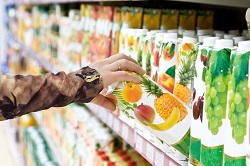Sustainable fruit juice packaging from organic matter
Over 67 million tonnes of packaging waste is generated annually in the EU, which corresponds to around one-third of all municipal solid waste. In developed countries, food packaging represents 60 % of all packaging. As a result, food packaging has become the most obvious source of waste generated by the public. Additionally, the fruit juice industries consume large volumes of water, both for the cleaning of equipment and facilities, as well as for the washing of fruit before they are transformed into juice. In recent years, the global volumes of wastewater production by the juice industries has increased to 34 200 million gallons when considering the general processing of fruits such as apples, apricots, cherries, citruses and peaches. During a final workshop in Brussels on 18 April 2016, the FP7-financed PHBOTTLE project gave an overview of its results and showcased the innovative packaging it has developed, which it hopes will contribute towards alleviating these extremely high levels of waste. Transforming organic matter The prototype PHBOTTLE packaging was obtained from the transformation of organic matter (mainly fermentable sugars such as glucose, fructose and maltose) present in the wastewater of the juice industry into a bioplastic material (PHB polyhydroxybutyrate). The concentration of fermentable sugars in juice processing wastewater can reach 70 % of the total organic load, containing almost 20 g/l of fermentable sugars, and making it an abundant source of cheap feedstock for PHB bioproduction. This material was enhanced with antioxidants to increase the shelf life of the juice, as well as its resistance characteristic. Progress has been made possible by combining the latest advances in biotechnology, packaging and microencapsulation technologies, to demonstrate the value of organic waste from the juice industries as a raw material to produce packaging for their own products. Contributing to a sustainable Circular Economy Revealing a number of the PHB-based prototype bottles during the workshop, the project coordinator Dr Ana Valera outlined the added environmental value of the project. ‘Our innovative packaging contributes to reducing the damage caused by conventional plastic materials,’ she commented. ‘Our packaging is environmentally friendly not only due to its natural origin (and not based on petroleum products) but also by the fact that the packaging production contributes to a decrease in the environmental impact of wastewater management in the juice industry.’ The PHBOTTLE project also uniquely contributes to the development of the concept of a ‘Circular Economy’ in Europe in two ways. Firstly, food industry wastewater treatment is a costly process due to the energy needs in the aeration basin and the cost of waste sludge disposal. Recovering valuable materials from raw wastewater will therefore reduce treatment and disposal costs. Second, the use of biodegradable food packaging material will reduce energy use and carbon dioxide emissions, as well as reducing waste treatment costs. Moreover, the PHBOTTLE team also believes that the material developed during the project can be utilised in other sectors aside from the packaging industries. One example highlighted by Dr Valera during the workshop was the material’s potential for use in the automotive sector for producing caps for car batteries. With the concept of the ‘Circular Economy’ currently being a major policy issue at EU-level, the PHBOTTLE project has made an important contribution to the growth of ‘green chemistry’ solutions for developing products and processes that reduce environmental impacts and reduces society’s dependence on petroleum-based products. The PHBOTTLE project is due to be completed at the end of April 2016 and received just under EUR 3 000 000 in EU funding. For more information please see: project website
Countries
Spain



